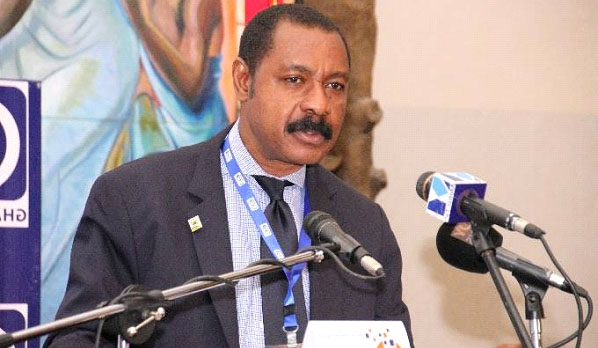Nana Osei Bonsu
Nana Osei-Bonsu, Chief Executive Officer (CEO) of the Private Enterprise Federation, has indicated that ideally Ghana should have at least 15 banks made up of 10 indigenous ones and five foreign with sound financial standing.
Speaking at a stakeholder engagement in Accra organised by the Economy Times, a financial newspaper, on the theme, “Ensuring private indigenous participation in our banking sector,” Nana Osei Bonsu called on the Bank of Ghana (BoG) to withdraw the licences of auditing firms that passed local banks that breached its financial regulations to serve as a deterrent to others.
He also called for the regular building of the capacity of the human resources of banks so that the top management would make investment decisions that would be in the best interest of the shareholders.
He added that at least 10 per cent of indigenous banks’ shares should be listed on the Ghana Stock Exchange (GSE) to ensure transparency and boost the confidence of shareholders.
Professor John Gatsi, Head of Finance Department, University of Cape Coast, in a presentation, blamed the Central Bank for failing to undertake broader stakeholder consultations before starting the indigenous banks’ recapitalisation exercise.
He said the Central Bank should have engaged in transparent and active debate involving bankers, policy-makers, politicians and other key stakeholders in the banking industry to ensure an alternative policy direction.
He noted that initially, the local banks were told to raise between GH¢250 million and GH¢290 million as minimum capital requirement and wondered why the Central Bank suddenly raised the amount to GH¢400 million.
He said Parliament, which had powers to approve or disapprove the utilisation of the taxpayers’ funds to support the liquidated banks, was not adequately consulted.
The Central Bank has so far revoked the operating licences of seven local banks within a year for various financial breaches.
These include UT Bank, Capital Bank, Beige Bank, Royal Bank, Sovereign Bank, Construction Bank and Unibank Ghana.
He cited the financial crisis that hit Sweden in the early 1990s as a case in point, noting that the government of Sweden at that time engaged in extensive stakeholder consultations for open, transparent and active debate before rolling out policies to resolve it.
Prof. Gatsi said the Central Bank should be partly blamed for the current banking crisis, adding that it was within its mandate to supervise the banks to check financial infractions.
By Samuel Boadi


